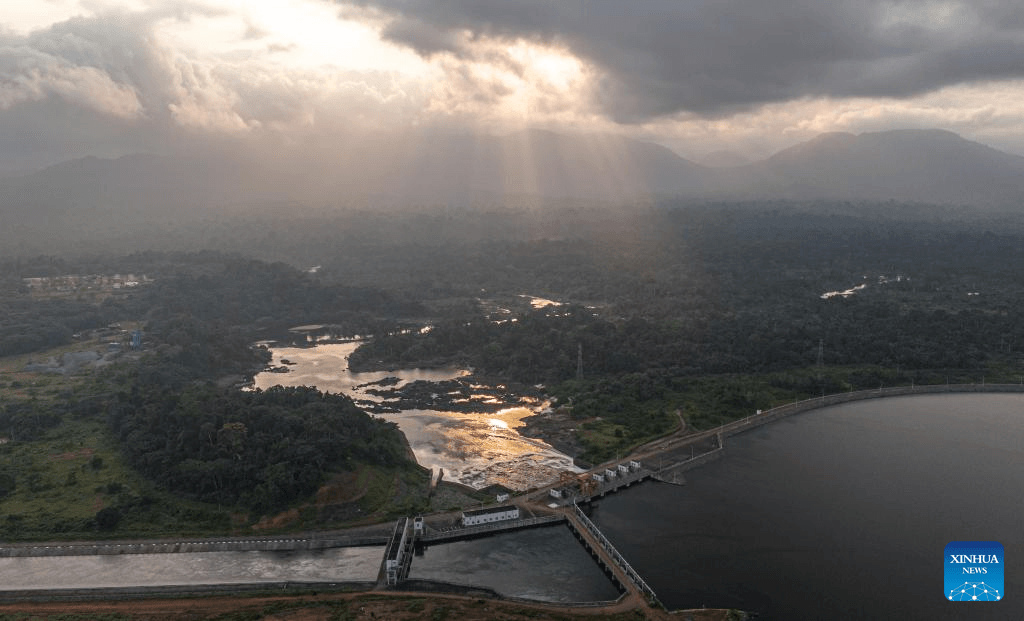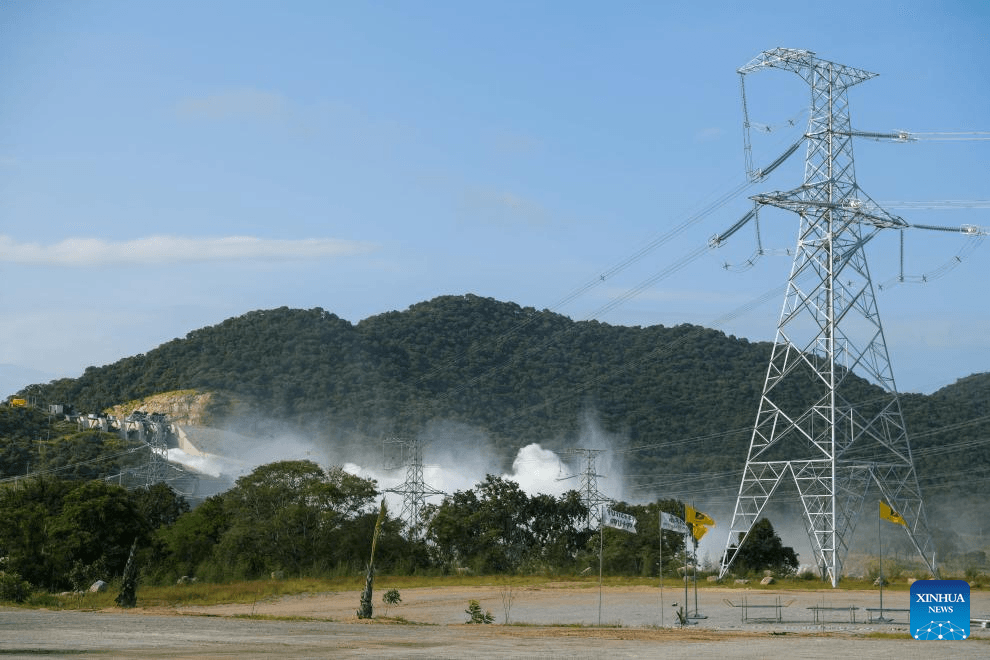The first thing you notice about Russo-Ukrainian war veteran Petro Buriak is that he wears prosthetic legs.
Sitting next to his wife at the Embassy of Ukraine in Nairobi, Petro was quick to tell us that on this very day (September 6) two years ago, he lost his limbs and two fingers.
“It was a normal day. It was the liberation of the city of Kherson. We fulfilled our tasks and were getting back to base," Petro said.
His two children, a son and a daughter, were also present during the interview.
Petro had volunteered to defend his country against the Russian aggression.
He had only served for about four months and was on the way back to base with his battalion when there was a blast and his body caught fire.
"I was driving a vehicle and the first right front wheel hit an anti-tank landmine. I took the first blast and those in the rear of the car were just thrown out of the vehicle. I immediately lost my limbs. They were not amputated; they were left on the scene," he said.
“Fingers were lost, my artery opened and I was burnt a little bit. The burning was good because I lost less blood. It stopped the bleeding.
"It all happened quickly, and the boys saved me because we were two cars and the car behind us, those guys were able to evacuate the wounded. And when they took us from the scene, a helicopter took me to the hospital.”
FOREBODING SENSE
Petro’s wife, Olena, said they had talked a day before the attack, but she had a bad feeling that something would happen.
On the day of the attack, she picked their children from school, and as she prepared something for them, the daughter, who had just started school, felt her legs hurt at the exact time the attack occurred.
“My daughter started crying ‘My feet hurt. They hurt so much’ she was crying, she was in pain, and we thought she fell and hit herself,” Olena says.
"She was not injured or hurt, but later we realised it was the same time the father was hit. It was about 5.30pm. Within an hour, I accidentally learn about this attack."
She started reaching out to all contacts of the people who served alongside her husband, and that is when she was informed that he had been hit.
Petro would go into a coma for days, coupled with life-threatening complications, but still survived.
He regained consciousness at a hospital in the port city of Odessa, and next to him was his wife, who told him he had lost both legs.
Before enlisting to join the army in defence of Ukraine, Petro was a truck driver and plied his trade across Europe.
He delivered goods to various countries in Europe, while his family was stationed in Lviv, western Ukraine.
Petro learned about the full-scale invasion while in Spain, where he had gone to deliver goods. He was listening to a Ukrainian radio online when it was announced, and his first decision was going to defend his country.
“It was 7 o'clock in the morning. I called my manager and told him the war has started," he said.
His manager asked, “What are you talking about?” Petro knew it even before them. He told him turn on the TV.
“I told him I'm going back. Do all paperwork so the vehicle will be left at the garage in Poland,” he said.
And so he finished his job in Spain and went to Warsaw, Poland, and left it there and asked them to pay him for the trip, and he went back to Ukraine.
I told him a few years ago you had a heart attack, your eyesight is not perfect, you’ve never held a rifle in your hands before. You are not fit for service. But there he was, already decided
DETERMINED TO VOLUNTEER
It was early spring and Easter, and while he thought about going directly to the conscription office, he decided to spend the week with his family.
That would not be the case, however, as he found himself volunteering the entire week at a cargo company that was supporting those at the frontline.
The only time he spent with his family was Easter weekend, and the Monday that followed, he enlisted despite having no military background.
“The Monday after Easter, I was at the conscription office. I was never in the military before,” Petro said.
"I had arrived as a fresh mint coin, and after a few weeks of training, they form the battalion, and we were moved to the frontline to defend our country."
His wife, Olena, was against the idea of him going to the frontline, but he stood his ground.
“I told him a few years ago you had a heart attack, had some serious heart problems, your eyesight is not perfect, you’ve never held a rifle in your hands before. You are not fit for service," she said.
"I was absolutely against even his coming back to Ukraine but there he was, already decided. What could you do? To try scolding him wouldn’t help."
She changed tack, telling him there were many jobs he could do to help the frontline from a safe distance.
“He could bring in the goods and help some organisations helping the frontline, but he had already made his decision,” Olena said.
Petro says he did not want to be remembered as someone who continued working and living a good life abroad when his country was struggling to liberate itself from the terror of Russia.
“I told my wife when we grow old, at some point, we will sit at a fireplace with our grandchildren,” he said.
"And they will ask what was our grandfather doing when there was the big war when Russians wanted to kill us all? What will you tell them? That I was working in Poland earning money and wasn’t here?"
Two years after the attack, Petro still goes to the frontlines to support those defending his country. Anytime he is with them, he feels more alive despite only doing it as a civic activist.
He insists that adjusting to life without his legs is not as difficult as losing someone you served with or the life the ‘boys’ live on the frontlines.
NO REGRETS
Despite losing his legs, Petro says he can still swim and also drive using the prosthetic legs.
“We just know that we have no right to surrender," he said.
“Whenever I visit the frontline, I ask the boys, 'What else do you need?' And the most important thing I tell them is that I don’t want to go far from them, but I understand that others also need help.”
His wife added, "In this situation, you don’t have a chance to think about what is easy or hard. You are a strong, free and independent person.
“War is not a fairy tale and everyone understands that. When he goes to the frontline, they see Petro as a ray of hope. He travels thousands of kilometres to support those on the frontlines."
On whether he regrets this decision, Petro says no. He adds that he would go back but with his current state, they cannot accept him (laughs).
His wife says she was afraid Petro would have a mental breakdown at some point in time because he keeps a lot of things to himself, but that has not been the case so far.
Olena said all they needed was physical rehabilitation, which they received from the Superhumans Hospital in Lviv. It specialises in prosthetics, an initiative started by Ukrainian First Lady Olena Zelenska to provide reconstructive rehabilitation to soldiers and victims of the war.
After seven months of rehabilitation, Petro and his wife founded the Invincible Warriors Foundation. It provides support including medical equipment, vehicles and gear.
The foundation was born out of what Petro's wife Olena did in addition to her day job when he enlisted to defend the country. She would reach out to friends and well-wishers to support those on the frontline.
Petro said it is funded by just ordinary citizens.
"People from all around the globe donate to the foundation, and it’s not only about money. Sometimes it’s goods. For instance, when soldiers need vehicles to evacuate people, when hospitals need beds, etc., this is the kind of support. When medical supplies come, we send them all to the frontline," he said.
“There are many regiments who don’t know me and I don’t know them. All I do is tell them I have brought you some supplies,” he adds.
Petro appealed to the world to extend more support to Ukraine because they need it to defeat Russia’s aggression.
The veteran said all countries must unite to stop the Russian aggression.
He said nobody wanted the Russo-Ukrainian war, people led normal lives and were thriving before, but that is not the case currently.
“I just want people in the world to know what Russia is. While I was here in Kenya, they hit a residential building, a whole family was killed, including a mother and three children,” Petro said.
"One was a seven-year-old girl who shares a name with our daughter Emilia and same age. The only survivor was the husband. How could he live with that?
“We are a small country compared to Russia and I want the world to understand that we need help. We were working, making money, travelling and raising our kids and living like normal citizens until they started the war. Nobody wanted it.”






![[PHOTOS] Ruto hosts VCs at State House](/_next/image?url=https%3A%2F%2Fcdn.radioafrica.digital%2Fimage%2F2025%2F09%2F054a20d6-456a-4aca-9fcc-1d6a16580667.jpg&w=3840&q=100)





